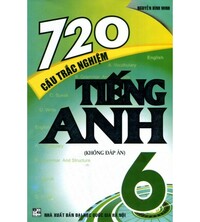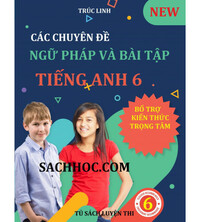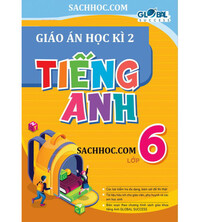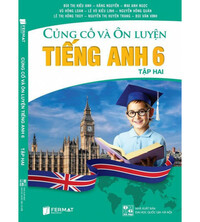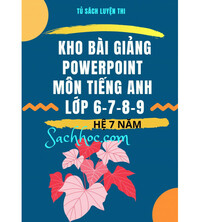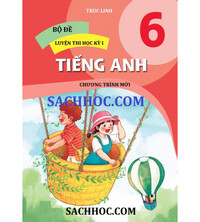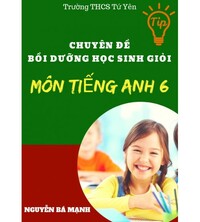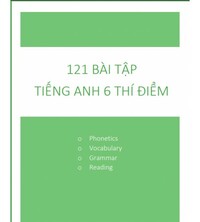Đề thi giữa kì 1 Tiếng Anh 6 English Discovery - Đề số 3
A. Choose the word whose underlined part is pronounced differently. B. Choose the word that has a different stressed syllable from the rest. A. Choose the best answer for each question. B. Fill in the blanks with one word to complete the conversation. A. Read the passage and decide if each statement is true (T) or false (F). Write T or F. B. Read the blog entry and complete the notes with below by filling putting ONE or TWO words in into each gap. A. Use the given words or phrases to make comple
Đề bài
I. PRONUNCIATION
A. Choose the word whose underlined part is pronounced differently.
1.
A. apple
B. plate
C. packet
D. sandwich
2.
A. milk
B. bean
C. three
D. meat
3.
A. bowl
B. potato
C. bacon
D. cola
B. Choose the word that has a different stressed syllable from the rest.
4.
A. cheeseburger
B. banana
C. potato
D. tomato
5.
A. restaurant
B. supermarket
C. omelette
D. mayonnaise
II. VOCABULARY AND GRAMMAR
A. Choose the best answer for each question.
6. There is __________ milk in the fridge. You don’t need to buy more.
A. too much
B. too many
C. any
D. not enough
7. “__________ bananas are there in the packet?” - “There are ten, I guess.”
A. How much
B. How many
C. How
D. How do
8. There are __________ of great recipes with eggs. You can try them at home.
A. too much
B. too many
C. a lot of
D. lots
9. I’d like to drink some __________ when I have dinner.
A. eggs
B. cola
C. bananas
D. pizza
10. In the kitchen, there are some apples but there isn’t __________.
A. any bread
B. a lot of carrots
C. any onions
D. some milk
11. I'm so thirsty. There is __________ water.
A. too many
B. not enough
C. too much
D. a lot of
12. “How many __________ of crisps do we need?” - “I think we need two.”
A. grams
B. litres
C. bottles
D. packets
13. You need to __________ an egg and take off the shells.
A. boil
B. bake
C. mix
D. cut up
14. “How __________ butter have you got?” - “I’ve got __________.”
A. many/three
B. many/some
C. much/any
D. much/some
15. You need to cook your food in a __________.
A. bowl
B. frying pan
C. fork
D. ketchup
16. If you want to have salad, you should go to a __________.
A. pizzeria
B. fast food restaurant
C. vegetarian café
D. burger bar
17. There are a lot of brownies on the plate, but there isn’t __________ bread.
A. any
B. much
C. some
D. lots of
18. __________ is a kind of sweet. People like it very much.
A. Cheeseburger
B. Hotdog
C. Biscuit
D. Pizza
19. How many calories __________ in a bottle of cola?
A. there are
B. are there
C. is there
D. there is
20. Can I have __________ apple, please?
A. an
B. a
C. any
D. some
B. Fill in the blanks with one word to complete the conversation.
Peter: How (21) __________ butter do we need to bake a cake?
Alan: We need 200 grams of butter.
Peter: (22) __________ there any flour in the cupboard?
Alan: No, there (23) __________.
Peter: I will go to the supermarket and buy some. Do we have any eggs?
Alan: There (24) __________ only one egg. It is not (25) __________ to bake a cake.
Peter: I will buy some eggs, too.
III. READING
A. Read the passage and decide if each statement is true (T) or false (F). Write T or F.
There are a lot of recipes with potatoes. My favourite recipe is baked potato. To cook this, you need some salt, pepper, olive oil and 3 to 5 fresh potatoes. You can cut the potatoes up and put some oil on them. Next, add salt and pepper. You can use butter instead of olive oil. Then place them in the oven and turn the heat to 400 degrees to cook the potatoes. After 20 minutes, the potatoes are ready. Place them on a plate to eat. You can have baked potatoes for lunch or dinner, or eat them with some mayonnaise. Enjoy!
26. There aren’t enough recipes with potatoes. _____
27. The ingredients for baked potatoes are salt, pepper, olive oil and potatoes. _____
28. You cannot use butter for baked potatoes. _____
29. To cook the potatoes, turn the heat to 400 degrees. _____
30. Baked potatoes can be dinner or lunch. _____
B. Read the blog entry and complete the notes with below by filling putting ONE or TWO words in into each gap.
What can you do with cheese?
There are hundreds of recipes with cheese! My favourite is brie, a kind of French cheese. The recipe isn’t very good for you, so don’t eat it every day!
The ingredients are 200g of brie, three slices of bread, an egg, some oil, some salt and pepper. First, cut up the bread into very small pieces and bake them for five minutes.
Beat the egg in a bowl and add some salt and pepper. Then cut up the brie into long, thin slices and put them one by one into the egg.
Fry the brie, bread and egg in some oil so they are brown on both sides and you can eat them with ketchup – delicious!
|
There are (31)__________ of great recipes with cheese. Brie is a kind of (32)__________ cheese. There are (33)__________ of bread in the recipe. In the recipe, you (34)__________ the egg before you put the cheese in it. In the recipe, you (35)__________ the cheese to cook it. |
IV. WRITING
A. Use the given words or phrases to make complete sentences.
36. Vietnam / there / a lot /restaurants.
=> ________________________________.
37. How much / oil / there / the bottle?
=> ________________________________.
38. She / got / six kilos / celery.
=> ________________________________.
B. Look at the suggested words and complete the conversation about a picnic list of foods and drinks.
39. A: How many bottles of water are there for the picnic?
B: ____________________________________________________. (four bottles)
40. A: ____________________________________________________? (any biscuits)
B: Yes, there are.
---------------THE END---------------
Đáp án
HƯỚNG DẪN GIẢI CHI TIẾT
Thực hiện: Ban chuyên môn
1. B
apple /ˈæpl/
plate /pleɪt/
packet /ˈpækɪt/
sandwich /ˈsænwɪtʃ/
Phần được gạch chân ở phương án B được phát âm /eɪ/, các phương án còn lại phát âm /æ/.
Chọn B.
2. A
milk /mɪlk/
bean /biːn/
three /θriː/
meat /miːt/
Phần được gạch chân ở phương án A được phát âm /ɪ/, các phương án còn lại phát âm /iː/.
Chọn A.
3. C
bowl /bəʊl/
potato /pəˈteɪtəʊ/
bacon /ˈbeɪkən/
cola /ˈkəʊlə/
Phần được gạch chân ở phương án C được phát âm /ə/, các phương án còn lại phát âm /əʊ/.
Chọn C.
4. A
cheeseburger /ˈtʃiːzbɜːɡə(r)/
banana /bəˈnɑːnə/
potato /pəˈteɪtəʊ/
tomato /təˈmɑːtəʊ/
Phương án A có trọng âm 1, các phương án còn lại có trọng âm 2.
Chọn A.
5. D
restaurant /ˈrestrɒnt/
supermarket /ˈsuːpəmɑːkɪt/
omelette /ˈɒmlət/
mayonnaise /ˌmeɪəˈneɪz/
Phương án D có trọng âm 3, các phương án còn lại có trọng âm 1.
Chọn D.
6. A
too much + danh từ không đếm được: quá nhiều
too many + danh từ số nhiều: quá nhiều
any + danh từ số nhiều/ danh từ không đếm được, thường dùng trong câu phủ định và nghi vấn: bất cứ/ bất kì
not enough + danh từ: không đủ
“milk” (sữa) là danh từ không đếm được
There is too much milk in the fridge. You don’t need to buy more.
(Có quá nhiều sữa trong tủ lạnh. Bạn không cần mua thêm nữa.)
Chọn A.
7. B
How much + danh từ không đếm được + is there?: Bao nhiêu
How many + danh từ số nhiều + are there?: Bao nhiêu
“bananas” (những quả chuối) là danh từ số nhiều => how many
“How many bananas are there in the packet?” - “There are ten, I guess.”
(Có bao nhiêu quả chuối trong giỏ? – Tôi đoán là có 10.)
Chọn B.
8. C
too much + danh từ không đếm được: quá nhiều
too many + danh từ số nhiều: quá nhiều
a lot of = lots of + danh từ số nhiều/ không đếm được: nhiều
There are lots of great recipes with eggs. You can try them at home.
(Có rất nhiều công thức nấu ăn tuyệt vời với trứng. Bạn có thể thử chúng ở nhà.)
Chọn C.
9. B
eggs (n): trứng
cola (n): nước ngọt có ga
bananas (n): những quả chuối
pizza (n): bánh pizza
I’d like to drink some cola when I have dinner.
(Tôi muốn uống nước ngọt có ga khi tôi ăn tối.)
Chọn B.
10. A
there is + danh từ không đếm được
any bread (n): bất cứ bánh mì => danh từ không đếm được, thường dùng trong câu phủ định
a lot of carrots: nhiều cà rốt => danh từ số nhiều, thường dùng trong câu khẳng định
any onions: bất cứ củ hành tây => danh từ số nhiều, thường dùng trong câu phủ định
some milk: một chút sữa => danh từ không đếm được, thường dùng trong câu khẳng định
In the kitchen, there are some apples but there isn’t any bread.
(Trong bếp, có một số táo nhưng không có chút bánh mì nào cả.)
Chọn A.
11. B
too many + danh từ số nhiều: quá nhiều
not enough + danh từ: không đủ
too much + danh từ không đếm được: quá nhiều
a lot of + danh từ: nhiều
“water” (nước) là danh từ không đếm được
I’m so thirsty. There is not enough water.
(Tôi khát quá. Không có đủ nước.)
Chọn B.
12. D
grams: gam
litres: lít
bottles: chai
packets: túi/ gói
“How many packets of crisps do we need?” - “I think we need two.”
(Chúng ta cần mấy gói khoai tây chiên? – Tôi nghĩ chúng ta cần hai.)
Chọn D.
13. A
boil (v): luộc/ đun sôi
bake (v): nướng
mix (v): trộn
cut up (v): cắt
You need to boil an egg and take off the shells.
(Chúng ta cần luộc một quả trứng và bóc vỏ.)
Chọn A.
14. D
many + danh từ số nhiều: nhiều
much + danh từ không đếm được: nhiều
some + danh từ số nhiều/ không đếm được, thường dùng trong câu khẳng định: một số
any + danh từ số nhiều/ không đếm được, thường dùng trong câu phủ định hoặc câu hỏi: bất cứ/ bất kì
“butter” (bơ) là danh từ không đếm được; “I’ve got” là câu khẳng định.
“How much butter have you got?” - “I’ve got some.”
(Bạn có bao nhiêu bơ? – Tôi có một ít.)
Chọn D.
15. B
bowl (n): chén/ bát/ tô
frying pan (n): cái chảo
fork (n): cái nĩa
ketchup (n): tương cà
You need to cook your food in a frying pan.
(Bạn cần nấu thức ăn trong một cái chảo.)
Chọn B.
16. C
pizzeria (n): tiệm bánh pizza
fast food restaurant (n): nhà hàng thức ăn nhanh
vegetarian café (n): cửa hàng thức ăn chay
burger bar (n): tiệm bánh burger
If you want to have salad, you should go to a vegetarian café.
(Nếu bạn muốn ăn salad, bạn nên đến cửa hàng thức ăn chay.)
Chọn C.
17. B
many + danh từ số nhiều: nhiều
much + danh từ không đếm được: nhiều
some + danh từ số nhiều/ không đếm được: một số/ một ít
lots of + danh từ số nhiều/ không đếm được, thường dùng trong câu khẳng định: nhiều
There are a lot of brownies on the plate, but there isn’t much bread.
(Có nhiều bánh sô-cô-la nhỏ trên đĩa, nhưng không có nhiều bánh mì.)
Chọn B.
18. C
cheeseburger: bánh burger phô mai
hotdog: bánh mì kẹp xúc xích
biscuit: bánh quy
pizza: bánh pizza
Biscuit is a kind of sweet. People like it very much.
(Bánh quy là một loại bánh kẹo. Mọi người rất thích nó.)
Chọn C.
19. B
Cấu trúc câu hỏi: How many + danh từ số nhiều + are there…? (Có bao nhiêu…?)
How many calories are there in a bottle of cola?
(Có bao nhiêu calo trong một chai cola?)
Chọn B.
20. A
a + danh từ số ít, bắt đầu bằng phụ âm
an + danh từ số ít, bắt đầu bằng nguyên âm
any + danh từ số nhiều/ không đếm được, thường dùng trong câu hỏi hoặc câu phủ định
some + danh từ số nhiều/ không đếm được, thường dùng trong câu khẳng định
“apple” (một quả táo) là danh từ số ít bắt đầu bằng nguyên âm.
Can I have an apple, please?
(Làm ơn cho tôi một quả táo được không?)
Chọn A.
21.
How much + danh từ không đếm được
butter (bơ) là danh từ không đếm được
How (21) much butter do we need to bake a cake?
(Chúng ta cần bao nhiêu bơ để nướng bánh?)
Đáp án: much
22.
Is there + danh từ không đếm được
flour (bột) là danh từ không đếm được
Is there any flour in the cupboard?
(Có chút bột nào trong tủ bát không?)
Đáp án: Is
23.
Câu hỏi “Is there…?” => Câu trả lời: Yes, there is./ No, there isn’t.
24.
There is + danh từ số ít
one egg: một quả trứng => danh từ số ít
There (24) is only one egg.
(Chỉ có một quả trứng.)
Đáp án: is
25.
enough (adj): đủ
It is not (25) enough to bake a cake.
(Nó không đủ để nướng bánh.)
Đáp án: enough
Bài hội thoại:
Peter: How (21) much butter do we need to bake a cake?
Alan: We need 200 grams of butter.
Peter: (22) Is there any flour in the cupboard?
Alan: No, there (23) isn’t.
Peter: I will go to the supermarket and buy some. Do we have any eggs?
Alan: There (24) is only one egg. It is not (25) enough to bake a cake.
Peter: I will buy some eggs, too.
Tạm dịch:
Peter: Chúng ta cần bao nhiêu bơ để nướng một chiếc bánh?
Alan: Chúng tôi cần 200 gram bơ.
Peter: Có bột mì trong tủ không?
Alan: Không, không có.
Peter: Tôi sẽ đi siêu thị và mua một ít. Chúng ta có trứng nào không?
Alan: Chỉ có một quả trứng. Nó không đủ để nướng một chiếc bánh.
Peter: Tôi cũng sẽ mua một ít trứng.
Tạm dịch bài đọc:
Có rất nhiều công thức nấu ăn với khoai tây. Công thức yêu thích của tôi là khoai tây nướng. Để nấu món này, bạn cần một ít muối, tiêu, dầu ô liu và 3 đến 5 củ khoai tây tươi. Bạn có thể cắt khoai tây ra và phết một ít dầu lên chúng. Tiếp theo, thêm muối và hạt tiêu. Bạn có thể dùng bơ thay cho dầu ô liu. Sau đó cho vào lò và vặn lửa 400 độ để khoai chín. Sau 20 phút, khoai tây đã sẵn sàng. Bày chúng ra đĩa để ăn. Bạn có thể ăn khoai tây nướng cho bữa trưa hoặc bữa tối, hoặc ăn với một ít sốt mayonnaise. Chúc ngon miệng!
26. F
There aren’t enough recipes with potatoes.
(Không có đủ công thức nấu ăn với khoai tây.)
Thông tin: There are a lot of recipes with potatoes.
(Có rất nhiều công thức nấu ăn với khoai tây.)
Chọn F.
27. T
The ingredients for baked potatoes are salt, pepper, olive oil and potatoes.
(Nguyên liệu cho món khoai tây nướng là muối, tiêu, dầu ô liu và khoai tây.)
Thông tin: My favourite recipe is baked potato. To cook this, you need some salt, pepper, olive oil and 3 to 5 fresh potatoes.
(Công thức yêu thích của tôi là khoai tây nướng. Để nấu món này, bạn cần một ít muối, tiêu, dầu ô liu và 3 đến 5 củ khoai tây tươi.)
Chọn T.
28. F
You cannot use butter for baked potatoes.
(Bạn không thể sử dụng bơ cho khoai tây nướng.)
Thông tin: You can use butter instead of olive oil.
(Bạn có thể dùng bơ thay cho dầu ô liu.)
Chọn F.
29. T
To cook the potatoes, turn the heat to 400 degrees.
(Để khoai chín, bạn vặn lửa đến 400 độ.)
Thông tin: Then place them in the oven and turn the heat to 400 degrees to cook the potatoes.
(Sau đó cho vào lò và vặn lửa 400 độ để khoai chín.)
Chọn T.
30. T
Baked potatoes can be dinner or lunch.
(Khoai tây nướng có thể ăn tối hoặc ăn trưa.)
Thông tin: You can have baked potatoes for lunch or dinner, or eat them with some mayonnaise.
(Bạn có thể ăn khoai tây nướng cho bữa trưa hoặc bữa tối, hoặc ăn với một ít sốt mayonnaise.)
Chọn T.
Tạm dịch bài đọc:
Bạn có thể làm gì với phô mai?
Có hàng trăm công thức nấu ăn với phô mai! Tôi thích nhất là brie, một loại phô mai của Pháp. Công thức này không tốt cho bạn, vì vậy đừng ăn nó hàng ngày!
Nguyên liệu là 200g brie, ba lát bánh mì, một quả trứng, một ít dầu, một ít muối và tiêu. Đầu tiên, cắt bánh mì thành những miếng rất nhỏ và nướng chúng trong năm phút.
Đập trứng vào bát, thêm chút muối và tiêu. Sau đó cắt brie thành từng lát mỏng, dài và cho từng lát một vào trứng.
Chiên khoai tây chiên, bánh mì và trứng trong một ít dầu để chúng có màu nâu ở cả hai mặt và bạn có thể ăn chúng với tương cà - ngon tuyệt!
31.
There are (31) hundreds of great recipes with cheese.
(Có hàng trăm công thức nấu ăn ngon với phô mai.)
Đáp án: hundreds
32.
Brie is a kind of (32) French cheese.
(Brie là một loại phô mai Pháp.)
Đáp án: French
33.
There are (33) three slices of bread in the recipe.
(Cần ba lát bánh mì theo công thức nấu ăn.)
Đáp án: three slices
34.
In the recipe, you (34) beat the egg before you put the cheese in it.
(Theo công thức nấu ăn, đánh trứng trước khi bạn đặt phô mai vào.)
Đáp án: beat
35.
In the recipe, you (35) fry the cheese to cook it.
(Theo công thức nấu ăn, bạn rán phô mai để nấu nó.)
Đáp án: fry
36.
Cấu trúc: Trạng từ, there are + danh từ số nhiều.
Đáp án: In Vietnam, there are a lot of restaurants.
(Ở Việt Nam, có nhiều nhà hàng.)
37.
Cấu trúc câu hỏi: How much + danh từ không đếm được + is there + trạng từ?
Đáp án: How much oil is there in the bottle?
(Có bao nhiêu dầu trong chai?)
38.
Cấu trúc với động từ “have got”: S (số ít) + has got + danh từ
Đáp án: She has got six kilos of celery.
(Cô ấy có 6 kg rau cần tây.)
39.
Cấu trúc: There are + danh từ số nhiều
A: How many bottles of water are there for the picnic?
(Có bao nhiêu chai nước cho buổi dã ngoại?)
B: There are four bottles.
(Có bốn chai.)
40.
Cấu trúc câu hỏi: Are there + (any) + danh từ số nhiều?
A: Are there any biscuits for the picnic?
(Có bánh quy nào cho buổi dã ngoại không?)
B: Yes, there are.
(Vâng, có.)
---------------THE END---------------
Search google: "từ khóa + timdapan.com" Ví dụ: "Đề thi giữa kì 1 Tiếng Anh 6 English Discovery - Đề số 3 timdapan.com"
